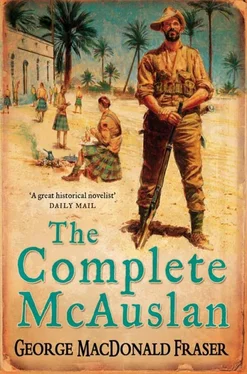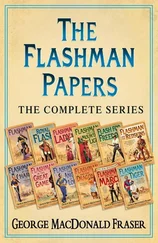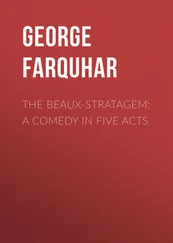Yet he enjoyed a curiously privileged position. In drill, for example, it was understood that there were three ways of doing things: the right way, the wrong way, and Wee Wullie’s way. His movements were that much slower, more ponderous, than anyone else’s; when he saluted, his hand did not come up in a flashing arc, but jerked up so far, and then travelled slowly to his right eyebrow. On parade, there was some incongruity in the sight of a platoon of wee Gleska keelies and great-chested Aberdonians (who run to no spectacular height, as a rule) with Gargantua in their midst, his rifle like a popgun in his huge fist, and himself going through the motions with tremendous intensity, half a second behind everyone else. There was almost a challenge in the way he performed, as though he was conscious of being different, and yet there was about him a great dignity. Even the Regimental Sergeant Major recognised it, and excused much.
This was when he was sober and passive. Even then he was withdrawn and monosyllabic; only when he was slightly inebriated could he be described as sociable. Beyond that he was just outrageous, a dangerous, wickedly powerful ruffian whom only the redoubtable McGarry could manage single-handed.
Yet there was in the battalion a curiously protective instinct towards him. It seemed to emanate from the Colonel, who had ordered that Wullie was never to be brought before him for disciplinary action except when it was unavoidable. Thus his crimes and misdemeanours were usually dealt with at company level, and he got off fairly lightly. When the Colonel did have to deal with him he would consign Wullie to the cells and afterwards try to find him a quiet niche where he would be out of trouble, invariably without success. When he was made medical orderly he got at the M.O.’s medicinal brandy and wrecked the place; he lost the job of padre’s batman through his unceasing profanity; attached to the motor transport section he got tremendously high and put a three-ton truck through a brick wall (“I always said that particular experiment was sheer lunacy,” said the Adjutant. “I mean, a truck was all he needed, wasn’t it?”). An attempt was even made to get him into the band, and the little pipe-sergeant was scandalised. “He has no sense of time, colonel sir,” he protested. “Forbye, look at the size of his feet, and think of that clumph-clumph—clumphing on the great ceremonial parades.”
In the end he was made the M.O.’s gardener, and he seemed to take to it. He did not do any actual gardening himself, but he could address the Arab gardeners in their own language, and got all the plants neatly arranged in columns of threes, dressed by the right, and in order of what he considered their seniority. For in his quiet moments there was a strong military sense in Wullie, as there should have been after 30 years in uniform. This was brought home to me in the only conversation of any duration I ever had with him, one day when I was orderly officer and was inspecting the whitewashed stones which Wullie’s Arabs were arranging in the headquarters plot. For some reason I mentioned to Wullie that I was not intending to stay in the Army when my number came up, and he said, with his direct, intent stare, “Then ye’re a fool, sir.” Only Wullie could have called an officer a fool, in a way which carried no disrespect, and only Wullie would have added “sir” to the rebuke.
And on another occasion he did me a great service. It was shortly after his Hogmanay escapade, and I was again orderly officer and was supervising the closing of the wet canteen. The joint was jumping and I hammered with my walking-stick on the bar and shouted, “Last drinks. Time, gentlemen, please,” which was always good for a laugh. Most of them drank and went, but there was one bunch, East End Glaswegians with their bonnets pulled down over their eyes, who stayed at their table. Each man had about three pints in front of him; they had been stocking up.
“Come on,” I said. “Get it down you.”
There were a few covert grins, and someone muttered about being entitled to finish their drinks—which strictly speaking they were. But there was no question they were trying it on: on the other hand, how does a subaltern move men who don’t want to be moved? I know, personality. Try it some time along the Springfield Road.
“You’ve got two minutes,” I said, and went to supervise the closing of the bar shutters. Two minutes later I looked across; they were still there, having a laugh and taking their time.
I hesitated; this was one of those moments when you can look very silly, or lose your reputation, or both. At that moment Wee Wullie, who had been finishing his pint in a corner, walked past and stopped to adjust his bonnet near me.
“Tak’ wan o’ them by the scruff o’ the neck and heave ’im oot,” he said, staring at me, and then went out of the canteen.
It was astonishing advice. About the most awful crime an officer can commit is to lay hands on another rank. Suppose one of them belted me? It could be one hell of a mess, and a scandal. Then one of them laughed again, loudly, and I strode across to the table, took the nearest man (the smallest one, incidentally) by the collar, and hauled him bodily to the door. He was too surprised to do anything; he was off balance all the way until I dropped him just outside the doorway.
He was coming up, spitting oaths and murder, when Wee Wullie said out of the shadows at one side of the door:
“Jist you stay down, boy, or ye’ll stay down for the night.”
I went into the canteen again. The rest were standing, staring. “Out,” I said, like Burt Lancaster in the movies, and they went, leaving their pints. When I left the canteen Wee Wullie had disappeared.
And now he was probably going to disappear for keeps, I thought that night after seeing him in the cell. How long would he get for assaulting a redcap? Two years? How old was he, and how would he last out two years on the hill, or the wells, or whatever diversions they were using now in the glasshouse? Of course, he was as strong as an ox. And what had McGarry meant, “For a’ the Colonel can say”?
What the Colonel did say emerged a few days later when the Adjutant, entering like Rumour painted full of tongues, recounted what had taken place at Battalion H.Q. when the town Provost Marshal had called. The P.M. had observed that the time had come when Wee Wullie could finally get his comeuppance, and had spoken of general court-martials and long terms of detention. The Colonel had said, uh-huh, indeed, and suggested that so much was hardly necessary: it could be dealt with inside the battalion. By no means, said the P.M., Wee Wullie had been an offence to the public weal too long; he was glasshouse-ripe; a turbulent, ungodly person whom he, the P.M., was going to see sent where he wouldn’t hear the dogs bark. The Colonel then asked, quietly, if the P.M., as a special favour to him, would leave the matter entirely in the Colonel’s hands.
Taken aback the P.M. protested at length, and whenever he paused for breath the Colonel would raise his great bald hawk head and gently repeat his request. This endured for about twenty minutes, after which the P.M. gave way under protest—under strong protest—and stumped off muttering about protecting pariahs and giving Capone a pound out of the poor box. He was an angry and bewildered man.
“So the matter need not go to the General Officer Commanding,” concluded the Adjutant mysteriously. “This time.” Pressed for details, he explained, in a tone that suggested he didn’t quite believe it himself, that the Colonel had been ready, if the P.M. had been obdurate, to go to the G.O.C. on Wee Wullie’s behalf.
“All the way, mark you,” said the Adjutant. “For that big idiot. Of course, if the G.O.C. happens to have been your fag at Rugby, I dare say it makes it easier, but I still don’t understand it.”
Читать дальше












